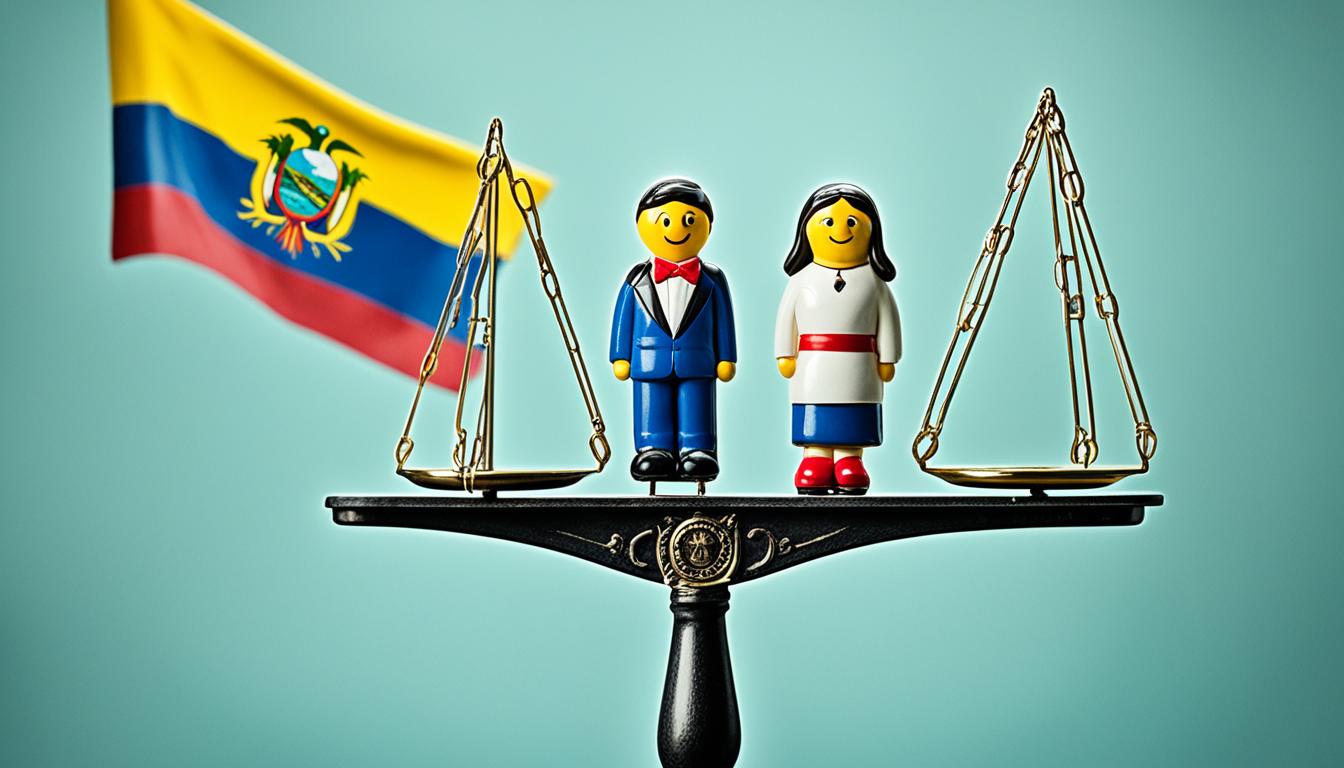Divorcing in Ecuador may present challenges and emotional turmoil, however, with proper guidance and knowledge of the legal system, it can be successfully managed. It is essential for both locals and expats to have a good understanding of divorce and separation laws in Ecuador. Being well-informed and prepared is crucial when it comes to aspects such as grounds for divorce, child custody, and property division.
If you’re considering getting divorced in Ecuador, it is highly recommended to seek the assistance of a lawyer specializing in family law. They can provide the necessary legal advice and guidance to help you navigate the process smoothly and protect your rights.
One of the first things you need to understand is the grounds for divorce in Ecuador. These include adultery, abandonment, abuse, and irreconcilable differences. Providing evidence or documentation to support the claimed grounds for divorce is essential.
The role of a lawyer in the divorce process is invaluable. They can assist you in understanding your rights and obligations, provide legal advice, and ensure that the process is fair and just. With their expertise, you can navigate the complex legal procedures involved in divorce, especially when it comes to child custody and property division.
The divorce process in Ecuador can be either consensual or contentious. In a consensual divorce, both parties must agree on the terms and file a joint petition. Mediation is a mandatory step where agreements regarding child custody, alimony, and property division are reached. If an agreement cannot be reached, the court will make a decision based on the evidence presented.
Child custody is determined based on the best interests of the child in Ecuador. The court takes into account factors such as the child’s age, preferences, and relationship with each parent when making custody decisions. Understanding your rights and presenting evidence supporting your case for custody is crucial.
Property division in Ecuador follows the principle of joint property. Any assets acquired during the marriage are considered joint property and are divided equally between spouses. However, the court may consider each spouse’s contributions and financial needs when dividing property.
Alimony, or spousal support, may be awarded if one spouse has significantly lower financial resources. The amount and duration of alimony are determined by the court based on the circumstances of the case. Presenting evidence of financial need is important in such cases.
After your divorce is finalized, you have the option to change your name or revert to your maiden name. This can be done as part of the divorce process. Once the marriage is legally dissolved, you are free to remarry in Ecuador.
Key Takeaways:
- Know the grounds for divorce in Ecuador, which include adultery, abandonment, abuse, and irreconcilable differences.
- Seek the assistance of a lawyer specializing in family law to navigate the divorce process and protect your rights.
- Understand the consensual and contentious divorce processes, including mandatory mediation sessions for agreements on child custody, alimony, and property division.
- Familiarize yourself with the factors considered by the court in child custody decisions, such as the child’s best interests, preferences, and relationship with each parent.
- Gather evidence of financial contributions and understand how property division works in Ecuador.
Grounds for Divorce in Ecuador
In Ecuador, there are several grounds for divorce that are recognized by law. These include adultery, abandonment, abuse, and irreconcilable differences. When seeking a divorce, it is important to provide evidence or documentation to support the claimed grounds for divorce.
Adultery is considered a valid reason for ending a marriage in Ecuador. If one spouse engages in a sexual relationship outside of the marriage, it can be grounds for divorce. Proof of infidelity, such as photographs, messages, or eyewitness testimonies, may be required to substantiate the claim.
Abandonment is another recognized ground for divorce in Ecuador. If one spouse leaves the marital home and refuses to return for an extended period of time without any valid reason, it may be considered abandonment. Evidence such as witness statements or documentation proving the spouse’s absence can support the claim.
Instances of abuse, whether physical or emotional, can also serve as grounds for divorce. If one spouse inflicts harm or causes significant emotional distress, it can be a valid reason for seeking a divorce. Victims of abuse should gather any available evidence such as medical records, police reports, or testimonies from witnesses who can support their claims.
Lastly, irreconcilable differences can be a ground for divorce in Ecuador. If the couple has reached a point where their differences are irreparable and there is no possibility of reconciliation, they can seek a divorce. While evidence may not be required in such cases, it is advisable to articulate the reasons for the irreconcilable differences clearly in the divorce petition.
It is important to note that divorce laws may vary in different jurisdictions within Ecuador, so consulting with a qualified lawyer is essential to ensure accurate and up-to-date information regarding the specific grounds for divorce applicable to your situation.
Summary of Grounds for Divorce in Ecuador:
| Grounds for Divorce | Evidence/Documentation |
|---|---|
| Adultery | Proof of infidelity, such as photographs, messages, or eyewitness testimonies |
| Abandonment | Witness statements or documentation proving the spouse’s absence |
| Abuse | Medical records, police reports, or testimonies from witnesses |
| Irreconcilable Differences | Clear articulation of the reasons for the irreconcilable differences |
The Role of a Lawyer in Divorce in Ecuador
During a divorce in Ecuador, emotions can run high and rational decision-making can become difficult. Hiring a lawyer can provide valuable legal advice and guidance, ensuring that your rights are protected and that the process goes smoothly. A lawyer can help navigate complex legal procedures, especially when children or significant assets are involved.
Expert Legal Advice and Guidance
Divorce proceedings involve a range of legal complexities that can be overwhelming for anyone going through the process. By enlisting the services of a lawyer for divorce in Ecuador, you gain access to expert legal advice and guidance. A knowledgeable attorney can offer insights into your rights and obligations, providing clarity and helping you make informed decisions.
Protection of Rights
In a divorce, it is crucial to protect your rights, and a lawyer plays a crucial role in ensuring that happens. They will advocate on your behalf, working to secure a fair and equitable outcome in matters such as child custody, alimony, and property division. With their expertise, you can navigate the legal landscape with confidence, knowing that your interests are being safeguarded.
Navigation of Complex Legal Procedures
Divorce proceedings in Ecuador can involve complex legal procedures, especially when there are children or significant assets at stake. A lawyer specializing in divorce cases can guide you through these complexities, ensuring that you meet all the necessary requirements and deadlines. From gathering and presenting evidence to filing the necessary paperwork, they provide invaluable assistance every step of the way.
“A lawyer is essential for divorce proceedings in Ecuador, as they bring legal expertise and experience to navigate the complex procedures involved and protect your rights during this emotionally challenging time.” – Maria Gonzalez, Family Law Attorney.

| Benefits of Hiring a Lawyer for Divorce in Ecuador |
|---|
| 1. Expert legal advice and guidance. |
| 2. Protection of your rights. |
| 3. Navigation of complex legal procedures. |
Divorce Process in Ecuador
In Ecuador, the divorce process can be approached in two ways – consensual or contentious. Let’s take a closer look at both options:
Consensual Divorce
A consensual divorce occurs when both parties mutually agree to end their marriage and are willing to cooperate in reaching a settlement. To initiate a consensual divorce, both spouses must submit a joint petition to the Family Court, outlining the terms and conditions of their divorce agreement.
The next step in a consensual divorce is attending a mandatory mediation session. During this session, a mediator helps the couple work through any disputes regarding child custody, alimony, and property division to ensure a fair and balanced agreement.
If the couple successfully reaches an agreement, the Family Court will review and approve their settlement, finalizing the divorce process.
Contentious Divorce
In contrast, a contentious divorce occurs when one or both parties are unable to agree on the terms and conditions of the divorce. In this situation, the process becomes more complex and involves additional legal proceedings.
If mediation fails, the case moves to court, and both parties will present their arguments and evidence to prove their stance on child custody, alimony, and property division. A judge will then make a decision based on the evidence and the best interests of all parties involved.
If contentious divorces involve complex legal issues, it is highly recommended to seek the guidance of a divorce lawyer. An experienced attorney can provide valuable advice, represent your interests in court, and ensure the protection of your rights throughout the process.

Whether you opt for a consensual or contentious divorce in Ecuador, it is important to understand the legal procedures and requirements involved. Seeking the assistance of a knowledgeable lawyer can help you navigate the complexities of the divorce process, ensuring that your rights are upheld, and a fair settlement is achieved.
| Consensual Divorce | Contentious Divorce |
|---|---|
| Both parties mutually agree | Disagreement on divorce terms |
| Submit joint petition to Family Court | Case moves to court |
| Attend mandatory mediation session | Present arguments and evidence in court |
| Reach agreement on child custody, alimony, and property division | Judge makes decision based on evidence and best interests |
Child Custody in Ecuador
When it comes to child custody in Ecuador, the best interests of the child take center stage. The court carefully evaluates various factors to make a decision that prioritizes the child’s well-being and ensures their emotional and physical development.
The factors considered in child custody decisions include:
- The child’s age: The court takes into account the child’s age to determine their level of maturity and ability to express their preferences.
- The child’s preferences: If the child is old enough, their own wishes and opinions may be taken into consideration.
- The relationship with each parent: The court examines the relationship between the child and each parent to assess the level of emotional connection and bonding.
- Emotional and physical well-being: The court considers the ability of each parent to meet the child’s emotional and physical needs, including providing a stable and nurturing environment.
- Parenting capabilities: The court evaluates the parenting abilities of each parent, taking into account factors such as the ability to provide care, guidance, and support.
- Co-parenting willingness: The court also considers the willingness of each parent to promote and facilitate a healthy and cooperative co-parenting relationship.
When seeking child custody in Ecuador, it is crucial to provide evidence supporting your case. This may include documentation of your relationship with the child, character references, medical reports, and any other relevant information that demonstrates your commitment and suitability as a parent.
It is important to have a clear understanding of your rights and obligations as a parent in the context of child custody in Ecuador. Consulting with a knowledgeable family lawyer can provide you with essential guidance and support throughout the process, helping you navigate the complexities of child custody proceedings and advocating for what is in the best interests of your child.
Image:

Property Division in Divorce in Ecuador
When going through a divorce in Ecuador, one important aspect to consider is the division of property. In Ecuadorian law, property acquired during the marriage is typically considered joint property, which means it is subject to equal division between spouses.
However, it’s crucial to note that the court may take into account various factors when determining property division. These factors can include each spouse’s contributions to the marriage, both financial and non-financial, as well as their respective financial needs.
To ensure a fair outcome, it is essential to gather evidence of each spouse’s contributions to the marriage. This evidence can include financial records, testimonies from witnesses, or any other relevant documentation. By presenting a clear picture of each spouse’s contributions, you can strengthen your case for a fair division of property.
It is also important to understand your rights and obligations regarding property division in Ecuador. Seeking legal advice from an experienced divorce lawyer can help you navigate this process and ensure that your rights are protected.
Here is an example of how property division in divorce in Ecuador may work:
| Asset | Value | Spouse A Contribution | Spouse B Contribution |
|---|---|---|---|
| House | $200,000 | $50,000 | $150,000 |
| Car | $30,000 | $15,000 | $15,000 |
| Savings Account | $50,000 | $10,000 | $40,000 |
In this example, the total joint property value is $280,000. Spouse A has contributed $75,000, while Spouse B has contributed $205,000. Based on the contributions, the court may order a division of the joint property that reflects the financial contributions of each spouse.
Remember, every divorce case is unique, and the division of property will depend on individual circumstances. Consulting with a lawyer who specializes in Ecuadorian family law can provide you with the guidance you need to navigate the property division process successfully.

Alimony in Divorce in Ecuador
During a divorce in Ecuador, the issue of alimony, also known as spousal support, may arise. Alimony can be awarded to a spouse who has significantly lower financial resources compared to the other spouse.
The court determines the amount and duration of alimony based on the specific circumstances of the case. It considers factors such as the financial need of the recipient and the ability of the paying spouse to provide support.
When seeking alimony, it is crucial to present evidence of financial need. This can include documentation of income, expenses, and any other relevant financial resources. Providing a comprehensive picture of the financial situation can strengthen your case in court.
“Alimony can provide essential financial support to the spouse in need, ensuring a fair and equitable outcome in the divorce process.”
The court takes various factors into account when determining alimony, including the length of the marriage, the standard of living established during the marriage, and the financial contributions of both spouses.
Additionally, the court considers the earning capacity of each spouse, their age, health, and any other relevant factors that may impact their financial situation.
Factors Considered in Determining Alimony
| Factors Considered by the Court | Description |
|---|---|
| Financial Need | The court assesses the financial resources of both spouses and determines if one spouse requires financial support. |
| Standard of Living | The court considers the lifestyle enjoyed during the marriage and strives to maintain a similar standard of living for both spouses, post-divorce. |
| Length of Marriage | The duration of the marriage is taken into account as a factor in determining the appropriate amount and duration of alimony. |
| Financial Contributions | The court examines the financial contributions made by each spouse during the marriage. |
| Earning Capacity | The court assesses the earning potential of each spouse, considering factors such as education, work experience, and skills. |
| Other Relevant Factors | The court may consider additional factors such as child custody arrangements, health conditions, and any other circumstances relevant to the financial needs of the spouses. |
It is crucial to have a thorough understanding of the factors considered by the court when determining alimony and to present a compelling case to support your financial needs.

Name Change and Remarriage After Divorce in Ecuador
In the process of divorce in Ecuador, individuals have the option to request a name change. This can be done as part of the legal proceedings and allows individuals to choose a new name or revert to their maiden name if desired. The court understands the importance of embracing a fresh start and grants this opportunity to individuals seeking a change.
Once the divorce process is completed and the marriage is legally dissolved, individuals in Ecuador are free to remarry. This means that they can enter into a new marital union without any legal restrictions or obligations from their previous marriage. It provides individuals with the opportunity to move forward and build a new chapter in their lives.
For those who wish to exercise their right to name change after divorce and pursue remarriage, it is important to consult with a knowledgeable lawyer who can guide them through the process and ensure that all legal requirements are met.

Conclusion
Divorce can be a challenging and emotionally charged process, especially for expats navigating the legal system in Ecuador. However, with practical advice and the right legal considerations, expats can ensure a smooth and successful divorce. It is crucial for expats getting divorced in Ecuador to seek legal advice and guidance from experienced professionals to protect their rights and interests.
Understanding the grounds for divorce, the role of a lawyer, and the divorce process in Ecuador is essential. Additionally, expats should be well-informed about child custody, property division, alimony, and name change/remarriage procedures. By taking practical steps and seeking professional assistance, expats can effectively navigate the complexities of divorce proceedings in Ecuador.
Legal considerations for expat divorce in Ecuador require attention to international laws and procedures. By staying informed and seeking proper legal guidance, expats can achieve a successful resolution and embark on a new chapter in life. Remember, seeking the right advice and assistance can alleviate the stress and uncertainty associated with divorce, ultimately leading to a positive outcome.
FAQ
What are the grounds for divorce in Ecuador?
The grounds for divorce in Ecuador include adultery, abandonment, abuse, and irreconcilable differences.
Do I need a lawyer for divorce in Ecuador?
It is advisable to hire a lawyer for divorce in Ecuador due to the emotional nature of the process and the need for legal advice and guidance.
What is the role of a lawyer in divorce in Ecuador?
A lawyer can provide valuable legal advice and guidance, ensuring that your rights are protected and that the process goes smoothly. They can help navigate complex legal procedures, especially when children or significant assets are involved.
What is the divorce process in Ecuador?
The divorce process in Ecuador can be either consensual or contentious. It involves filing a petition, attending mediation, and reaching agreements on child custody, alimony, and property division. If an agreement cannot be reached, the court will make a decision based on the evidence presented.
How is child custody determined in Ecuador?
Child custody in Ecuador is determined based on the best interests of the child. The court considers factors such as the child’s age, preferences, and relationship with each parent when making a decision.
How is property divided in divorce in Ecuador?
Property acquired during the marriage is considered joint property and is divided equally between spouses. However, the court may consider factors such as each spouse’s contributions and financial needs when dividing property.
Is alimony awarded in divorce cases in Ecuador?
Alimony, or spousal support, can be awarded in cases where one spouse has significantly lower financial resources than the other. The amount and duration of alimony are determined by the court based on the circumstances of the case.
Can I change my name or remarry after divorce in Ecuador?
In Ecuador, it is possible to request a name change as part of the divorce process. Once the divorce process is finalized and the marriage is legally dissolved, you are free to remarry in Ecuador.
What Are the Essential Tips for Navigating Divorce in Ecuador and How Do They Compare to Navigating Divorce in Brazil?
When navigating divorce key steps in Ecuador, it’s crucial to understand the legal requirements and process for dissolution of marriage. In Brazil, the process may differ in terms of documentation, division of assets, and child custody. Seeking legal counsel and understanding local laws are essential in both countries.










